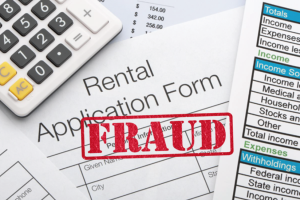
Did you know that 25% of evictions involve some form of a fraudulent application? According to NMHC (National Multifamily Housing Council) 70% of housing provider respondents reported experiencing an increase in fraudulent applications or payments utilizing falsified or altered documentation.
These are the 4 Most Common Types of Application Fraud
- Income Fraud: Applicants may alter or falsify W2s or pay-stubs to increase their gross income and meet the rent multiplier qualifications.
- Identity Theft: Applicants have used other people’s identifications or social security numbers to thwart background and credit checks.
- Employment Fraud: Applicants might provide false employment information along with made-up references. They may also include fake employer references, start dates, or fabricated job titles to income qualify.
- Rental History: Applicants may provide references to family members posing as rental providers or previous landlords. They do this to hide any past rent collections, delinquencies, or evictions.
How to Recognize a Potentially Fraudulent Rental Application
- Inconsistent Documentation or Information: For example, if addresses on the application do not match their credit report or there are gaps in their employment information. In some cases, the pay-stubs provided don’t show the applicants name or employer information.
- Altered Documents: Look for missing company logos, mismatching font sizes or types, areas not aligned, faded numbers or letters. You can also run these documents through ChatGPT or similar and prompt it to check if the documentation has been altered.
- Difficulty in obtaining information: If the applicant is reluctant to provide proof of employment, W2s, pay-stubs, or references.
- “I Need to Move ASAP” or Rushing the Rental Process: Applicants may push the timing of the application process to avoid some potential negative credit items, not disclose recently being terminated from their job, or by-passing a thorough background check.
How do you avoid Rental Application Scams?
Disclaimer: Abide by all Fair Housing and Local Rent Ordinance Law
- Thorough Screening Process: Rental software or online services are available for a complete comprehensive background and credit check. These reports will pull from public records to check criminal history, eviction records, and for any previous collections. These screenings are generally paid for by the applicant as well.
- Employment verification: Directly contact employers and their HR Departments to verify. There’s also an employment verification option within rental software for an additional charge.
- Rental verification history: Contact all previous landlord references. The most important are not their most recent but the older references because a most recent landlord may lie to get rid of a bad tenant. Make sure to vet the references to make sure they’re not posing as a landlord.
- Fraud Detection Software: There are online tools and software you can utilize that will assist in verifying information or detecting if there are altered documents.
- In-Person Tours: Meet the applicant in person when they tour the property or have your manager sign in with their ID as part of touring the unit. This way you can verify the person and ask your questions again to check for any discrepancies. At our properties, we will not rent a unit “site unseen”, an applicant must tour the unit regardless if they’re local or out-of-state.
Renter protection laws are getting more stringent making it very difficult to evict any bad tenants that are exhibiting criminal activity or behavior, non-paying, habitually delinquent on rent, or renting on behalf of someone else that wouldn’t otherwise qualify.
With applicants having online tools to alter and falsify documentation, it’s extremely important to be aware, analytical, and detailed when screening your applicants.
In addition, I conduct a 15-minute pre-move-in call once the applicant has been approved to review all our procedures for living at the property. I take this opportunity to ask some of the questions from the rental application again checking for any discrepancies before moving them in on a permanent basis.
In speaking with our client’s, leasing activity is much higher than in 2024, I anticipate occupancy rates to stay high with strong market rents.
